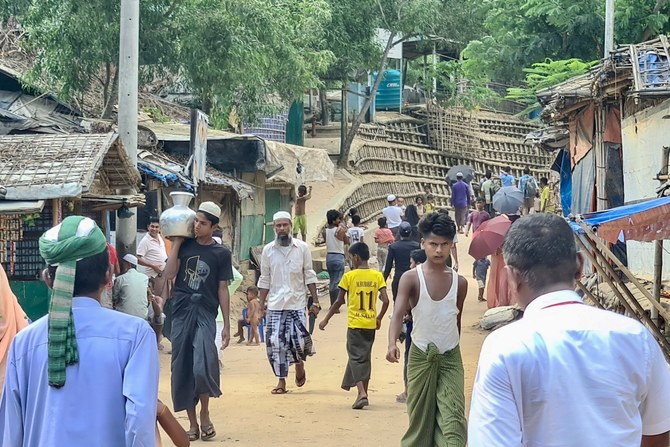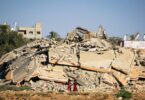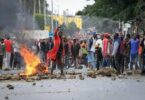Dr. Azeem Ibrahim
In the relentless tragedy unfolding in Myanmar, the junta has escalated its brutal tactics to maintain control, plunging ethnic minorities, especially the Rohingya, into deeper despair. As international attention ebbs and flows, the military regime has adapted, finding new ways to perpetuate suffering and quash dissent. The latest tools in their arsenal: starvation and ethnic division.
The Rohingya, a Muslim minority long persecuted in Myanmar, now face an insidious strategy aimed at their systematic destruction. Reports have surfaced detailing how the military deliberately uses starvation as a weapon of war. By denying food, aid and necessities to Rohingya communities, the junta forces desperation upon them, leaving starvation as the grim alternative to submission.
This tactic serves a dual purpose for the military. Firstly, it weakens the resolve of Rohingya communities, making them more susceptible to forced recruitment. Desperate for any means to survive, some Rohingya have been coerced into fighting for the junta against their own people, a horrific twist of fate that deepens their suffering. Secondly, the junta uses starvation to manipulate international aid access, controlling the flow of humanitarian assistance to further isolate and punish dissenting communities.
The brutality does not end with starvation. Recognizing its inability to crush resistance outright, the junta has turned to a more insidious strategy: fostering conflicts between ethnic groups. By sowing seeds of discord and manipulating ethnic tensions, the military aims to divert attention from its own atrocities and weaken unified opposition.
The Arakan Army, a prominent ethnic armed group challenging military rule, has been particularly instrumentalized in this strategy. Accused of committing abuses against the Rohingya and spreading harmful rhetoric, the Arakan Army’s actions have played into the military’s hands. Reports of beheadings, killings and the burning of Rohingya property underscore the depths of this human tragedy. As a result, an additional 45,000 Rohingya have been forced to flee their homes, seeking refuge from both military oppression and inter-ethnic violence.
The UN has sounded the alarm but international responses have been woefully inadequate. Diplomatic condemnations and economic sanctions, while important, have not stemmed the tide of suffering. The Rohingya and other ethnic minorities continue to bear the brunt of a conflict that shows no signs of abating.
Bangladesh, already burdened with hosting more than a million Rohingya refugees, faces intensified challenges as conflict in Myanmar and monsoon rains worsen conditions. The recent influx has strained resources and infrastructure, exacerbating humanitarian crises in overcrowded camps. The country struggles to provide adequate shelter, food and healthcare amid ongoing instability, highlighting the urgent need for international support and sustainable solutions to alleviate the Rohingya’s plight.
The international community’s failure to protect the Rohingya reflects a broader pattern of indifference and ineffectiveness in responding to atrocities. Despite widespread recognition of Myanmar’s descent into brutality, meaningful action remains elusive. Political calculations, economic interests and geopolitical strategies often overshadow humanitarian imperatives, leaving vulnerable populations to fend for themselves.
For the Rohingya, justice seems a distant dream. Displaced, persecuted and now exploited in a cruel cycle of violence, they face an existential threat that demands urgent and decisive action. The principles of human rights and international law, once held as universal standards, ring hollow in the face of Myanmar’s impunity.
What can be done? The answer lies in concerted, coordinated efforts that prioritize humanitarian aid, accountability for perpetrators of violence and genuine dialogue aimed at reconciliation. The international community, and the Association of Southeast Asian Nations in particular, must bolster support for humanitarian agencies on the ground, ensuring that aid reaches those most in need despite the military’s attempts to obstruct it.
Furthermore, diplomatic pressure must intensify, targeting not only the military leaders but also those who support and enable their atrocities. Economic sanctions should be expanded and enforced rigorously, targeting key industries and individuals that sustain the junta’s grip on power.
Beyond immediate measures, a long-term strategy is essential. This includes supporting Myanmar’s civil society, strengthening democratic institutions and promoting inter-ethnic dialogue and reconciliation. The Rohingya and other minorities must have a seat at the table in shaping Myanmar’s future, free from fear and persecution.
The crisis in Myanmar is not just a humanitarian catastrophe; it is a moral test for the international community. Failure to act decisively risks emboldening not only the Myanmar junta, but also other regimes that seek to suppress dissent through violence and division.
As we bear witness to Myanmar’s descent into darkness, we must summon the courage to confront injustice and uphold the dignity of every human being. The Rohingya deserve more than our sympathy; they deserve our unwavering commitment to justice and our steadfast determination to end their suffering.
In the face of brutality, silence is complicity. Let us not be silent. Let us stand together in solidarity with the Rohingya and all those who suffer under oppression, affirming that their lives and their rights matter, today and always.







